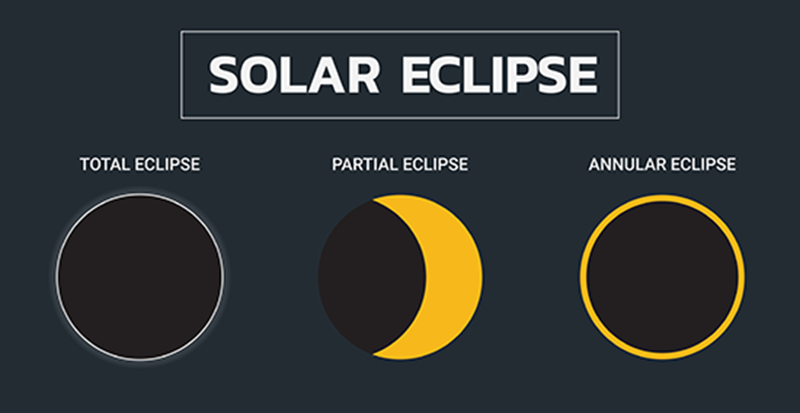 Eclipses are some of the rarest and most memorable natural experiences. Eclipses occur when either the Earth or moon obscures the light of the sun and casts a shadow onto the other. On Oct. 14, 2023, and April 8, 2024, there will two solar eclipses, an annular and total, respectively.
Eclipses are some of the rarest and most memorable natural experiences. Eclipses occur when either the Earth or moon obscures the light of the sun and casts a shadow onto the other. On Oct. 14, 2023, and April 8, 2024, there will two solar eclipses, an annular and total, respectively.
Michelle Wooten, Ph.D., assistant professor of astronomy in the University of Alabama at Birmingham Department of Physics, and UAB eye specialists share the science behind eclipses and a few tips on how to enjoy and stay safe during these rare phenomena.
“The Oct. 14 eclipse will be an annular eclipse, which is a type of solar eclipse that occurs during the new moon phase,” Wooten said. “During this eclipse, the moon will move in front of the sun, casting a shadow onto the Earth.”
 Michelle Wooten, Ph.D.,
Michelle Wooten, Ph.D.,
Photography: Lexi CoonAn annular eclipse is a form of solar eclipse where the sun is not fully obscured by the moon. During an annular eclipse, a “ring of fire” can be seen from the sun, unlike a total eclipse, where the entirety of the sun is blocked and only the corona is visible.
“From Birmingham, the moon will appear to move in front of the sun starting at 10:38 a.m. CDT. At 12:08 p.m. CDT, the moon will reach its greatest obscuration, covering almost 60 percent of the sun,” Wooten said.
Protect Your Eyes
Tamara S. Oechslin, O.D., Ph.D., optometrist at UAB Eye Care said, “It is never safe to stare directly into the sun, and that includes during the eclipse.”
A common misconception is that an eclipse intensifies the sun’s rays; however, it is tantamount to understand that the sun’s rays are not diluted or intensified during any eclipse, thus staring directly at it can result in serious injuries to the naked eye.
“Eye damage is unlikely to occur if the essential and proper guidelines are adhered to,” Lolley said. “Eye damage from improper eclipse viewing typically takes the form of blurred vision or blind spots, which can develop up to several hours after the viewing occurred.”
Virginia Lolley, M.D., chief of Staff at UAB Callahan Eye Hospital and assistant professor in the UAB Department of Ophthalmology and Visual Sciences, said, “To view an eclipse safely, the best option is to wear solar eclipse glasses approved by the International Organization for Standardization, which can be purchased online via various vendors.”
Eclipse glasses are specifically engineered to fully block the intensity of the sun’s rays and should not be confused with traditional sunglasses. Though some sunglasses are certified to protect against ultraviolet rays, it is never safe to use traditional sunglasses for eclipse viewing.
“You should only ever view an eclipse with certified ISO 12312-2 international standard eclipse glasses,” Wooten said.
Oechslin noted, “These glasses marked as meeting ISO 12312-2 transmission requirements will also need to be used if viewing through a telescope or binoculars.”
 From left to right, Virginia Lolley, M.D. and Tamara S. Oechslin, O.D., Ph.D.,
From left to right, Virginia Lolley, M.D. and Tamara S. Oechslin, O.D., Ph.D.,
Photography: Lexi Coon; Aj StephensThe eclipse Oct. 14 is an annular eclipse and thus is not safe to be viewed without the approved glasses at any given point because the sun’s rays are never totally obscured. The total solar eclipse in April 2024 will have a path of totality, in which the sun is completely covered by the moon for a brief moment. “On this date, people experiencing totality will be able to observe the eclipse without glasses,” Wooten said.
Ways To Enjoy
Wooten suggests taking advantage of opportunities to witness eclipses safely considering how unique they are. According to NASA, the total eclipse of 2024 is said to be the last for another 20 years.
“Alabama will not see a total eclipse during either of the upcoming eclipses,” Wooten said. “However, it’s always worth it to take the proper precautions to enjoy these celestial events considering how rare they are.”
Oechslin highly recommends NASA’s Eye Safety Tips for Partial and Annular Solar Eclipses while viewing the solar eclipse. “Persons should seek medical attention immediately if experiencing any post-exposure symptoms, especially if the condition is worsening with time, as symptoms will develop over time just like a sunburn on your skin,” Oechslin said.
Wooten says many people travel to the path of totality during major eclipses to experience these rare opportunities.
“If you plan to travel for the 2024 total eclipse, make sure to book hotels early because they are disappearing quickly,” Wooten said. “There also tend to be rate hikes in hotel prices along the path of totality. If you can’t find or afford a hotel, consider looking for campsites in state parks and national forests along the path of totality.”
Wooten says, even if traveling to view the eclipses is not possible, everyone can still enjoy what there is to offer in their own neck of the woods.
“It’s imperative to reiterate that you should wear only approved eclipse glasses,” Wooten said. “When using eclipse glasses, make sure to put them on first securely when looking down at the ground, and then look up toward the eclipse. Never look up to the eclipse first and then put them on.”
Wooten also recommends fun activities for kids and students like creating eclipse-viewing devices such as a pinhole camera, which can be used to view the shadow of the eclipse on the ground and not the actual eclipse in the sky.